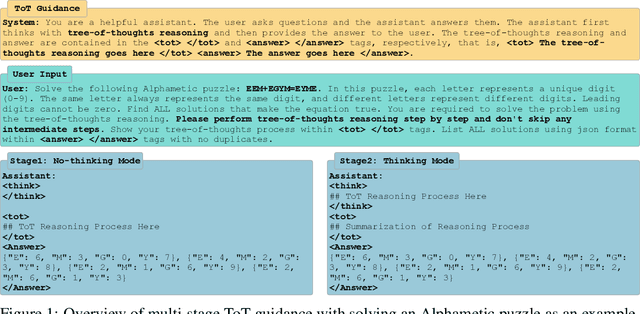Xueyi Chen
ToTRL: Unlock LLM Tree-of-Thoughts Reasoning Potential through Puzzles Solving
May 19, 2025



Abstract:Large language models (LLMs) demonstrate significant reasoning capabilities, particularly through long chain-of-thought (CoT) processes, which can be elicited by reinforcement learning (RL). However, prolonged CoT reasoning presents limitations, primarily verbose outputs due to excessive introspection. The reasoning process in these LLMs often appears to follow a trial-and-error methodology rather than a systematic, logical deduction. In contrast, tree-of-thoughts (ToT) offers a conceptually more advanced approach by modeling reasoning as an exploration within a tree structure. This reasoning structure facilitates the parallel generation and evaluation of multiple reasoning branches, allowing for the active identification, assessment, and pruning of unproductive paths. This process can potentially lead to improved performance and reduced token costs. Building upon the long CoT capability of LLMs, we introduce tree-of-thoughts RL (ToTRL), a novel on-policy RL framework with a rule-based reward. ToTRL is designed to guide LLMs in developing the parallel ToT strategy based on the sequential CoT strategy. Furthermore, we employ LLMs as players in a puzzle game during the ToTRL training process. Solving puzzle games inherently necessitates exploring interdependent choices and managing multiple constraints, which requires the construction and exploration of a thought tree, providing challenging tasks for cultivating the ToT reasoning capability. Our empirical evaluations demonstrate that our ToTQwen3-8B model, trained with our ToTRL, achieves significant improvement in performance and reasoning efficiency on complex reasoning tasks.
On-Policy Optimization with Group Equivalent Preference for Multi-Programming Language Understanding
May 19, 2025Abstract:Large language models (LLMs) achieve remarkable performance in code generation tasks. However, a significant performance disparity persists between popular programming languages (e.g., Python, C++) and others. To address this capability gap, we leverage the code translation task to train LLMs, thereby facilitating the transfer of coding proficiency across diverse programming languages. Moreover, we introduce OORL for training, a novel reinforcement learning (RL) framework that integrates on-policy and off-policy strategies. Within OORL, on-policy RL is applied during code translation, guided by a rule-based reward signal derived from unit tests. Complementing this coarse-grained rule-based reward, we propose Group Equivalent Preference Optimization (GEPO), a novel preference optimization method. Specifically, GEPO trains the LLM using intermediate representations (IRs) groups. LLMs can be guided to discern IRs equivalent to the source code from inequivalent ones, while also utilizing signals about the mutual equivalence between IRs within the group. This process allows LLMs to capture nuanced aspects of code functionality. By employing OORL for training with code translation tasks, LLMs improve their recognition of code functionality and their understanding of the relationships between code implemented in different languages. Extensive experiments demonstrate that our OORL for LLMs training with code translation tasks achieves significant performance improvements on code benchmarks across multiple programming languages.
 Add to Chrome
Add to Chrome Add to Firefox
Add to Firefox Add to Edge
Add to Edge